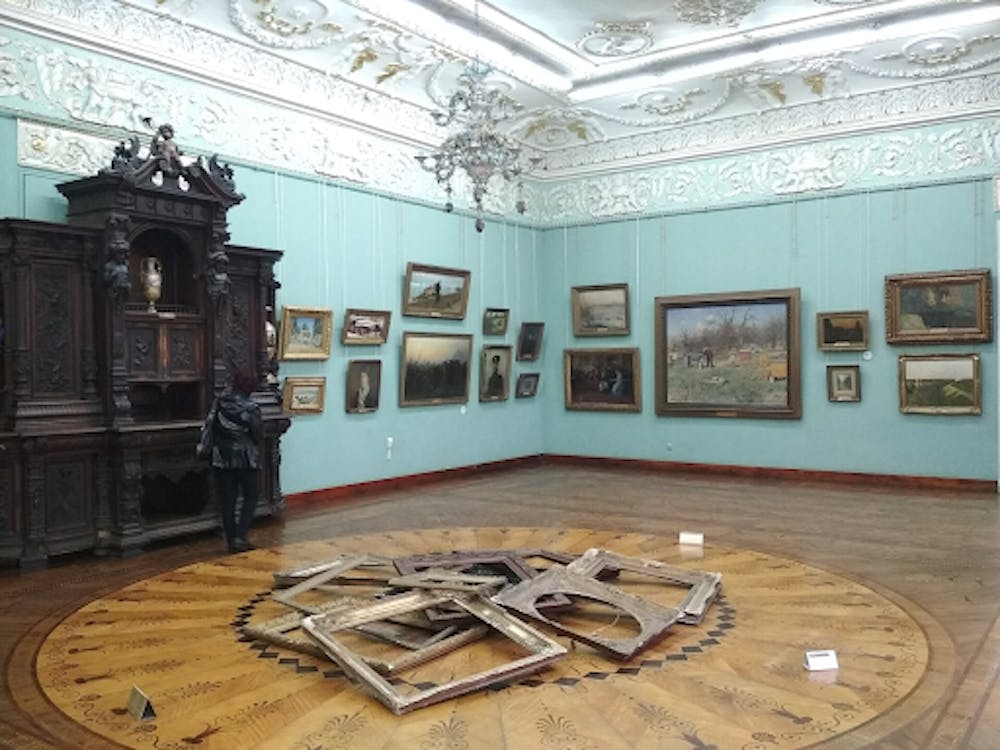By Lilly Ward
Staff Writer
The College held a panel in the library auditorium on Feb. 20, discussing the destruction of Ukrainian art and artifacts and the efforts of archivists to preserve Ukrainian culture, as part of the program known as “Two Years Gone” which explores the impact of the ongoing war on Ukraine’s cultural heritage.
The panelists included Oleksandra Kovalchuk, the director of Odesa Fine Arts Museum, The College’s Archivist and Special Collections Librarian, Debra Schiff and Dr. Tetyana Yaroshenko, Head of the research management office at the National University of Kyiv. The discussion was moderated by Taras Pavlovsky, dean of the College’s Library.
The destruction of cultural sites and artifacts due to ongoing conflicts is a pressing issue, as war perpetuates cultural genocide. Artifacts attest to historical events and often hold deep symbolic value. Awareness of the often strategic elimination of artifacts is more important as ever as the destruction of cultural sites and objects is currently taking place not only in Ukraine as the war continues, but also as a result of the Israel–Hamas war.
Often, the devastation of war leaves important institutions such as museums emptied of their objects, as museums are forced to remove the artwork or risk its obliteration. Kovalchuk described the anxiety surrounding preserving the collection at the Odesa Fine Arts Museum. The museum managed to evacuate most of the extensive collection before the Russian invasion, while also managing to help other museums protect their collections. They then turned their attention to preserving public monuments.
“At that moment, it was chaotic. And for some museums, it was like, imagine taking Mona Lisa from the wall and throwing it into your truck,” said Kovalchuk.
Even after the departure of the art, tours were still given of Odesa Museum. However, this time it was the haunting emptiness of the neoclassical building that left an impression on viewers. Eventually, the museum began to work with contemporary artists, who documented the experience of the war through their art.
Despite the difficulty of finding new temporary homes for the collection, which traces its history from the 19th century, the efforts were well worth the struggle. On Nov. 5, 2023, the museum building sustained significant damage following a Russian air attack.
Within five weeks, the museum had reopened, according to Kovalchuk. This time there was a Christmas tree in the museum.
“In war, it's really important to have faith in good things,” said Kovalchuk.
While Kovalchuk spoke to the ability of art to instill resilience in times of war, both Schiff and Yaroshenko offered insight into the importance of documenting Ukrainian’s experience.
Schiff cited the importance of organizations such as the International Center for the Study of the Preservation and Restoration of Cultural Property, an intergovernmental organization dedicated to the preservation of cultural heritage. ICCROM has been instrumental in documenting damage to cultural sites.
“Ukrainian culture, past, present and future, is on the front lines of the brutal war in Ukraine,” said Yaroshenko. She also raised concern for the fate of libraries in Ukraine.
According to Library Journal, 155 libraries have been fully destroyed by Russian forces. A December 2022 report issued by the Ministry of Culture and Information Policy stated that the devastation of Ukrainian libraries is responsible for close to 40 percent of all damage to the country’s cultural heritage infrastructure. Prior to the war, over 14,350 Ukrainian public libraries served as an interconnected network of institutions. However, by the end of 2022, the number fell to 11,993.
“The first step is destroying books, " said Yaroshenko. “Destroying the culture and heritage of Ukraine is an attack not only against the Ukrainian people, but also against world culture and heritage.”







